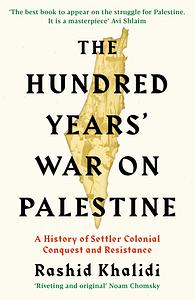You need to sign in or sign up before continuing.
Take a photo of a barcode or cover
emotional
informative
sad
fast-paced
challenging
dark
informative
medium-paced
challenging
informative
medium-paced
This is one of the most enlightening pieces of media regarding Palestine that I have encountered so far. The author, a leading Palestinian-American historian, provides knowledge and context that pieces together the history of Palestine and Israel in a way that gives you a clearer understanding of the situation in the present day.
The book starts us at the beginning, discussing how the crumbling of the Ottoman Empire at the end of WWI changed the landscape drastically, and then the foundations laid down by the founders of Zionism and the UK, which the US later inherited. The author covers this intensively, discussing both failures by proponents of Israel and Palestinian resistance.
The author also provides valuable information about the Palestinian resistance such as the PLO and later Hamas. The book covers how the PLO often was disconnected from Palestinian civilians who did not feel heard or supported by them, and how this led to more extreme movements for liberation.
I appreciated how the book covered how UK and US policy has changed overtime towards Israel and Palestine, ending in 2017 with the Trump administration that deviated from standard US policy and outsourced more policies to Israeli oversight, which led to the annexation of Jerusalem and the Golan Heights among other policy changes that have greatly increased tensions in the region.
Another valuable point of view given is how settler colonial movements in other regions, such as Ireland and Native America share commonalities with Palestine and what people there have gone through for the last hundred years, including a system of segregation that seats Palestinians below Israelis.
This leads into the author’s main takeaway, which is that mutual acceptance between Palestinians and Israelis is the best path forward for peace. Rashid Khalidi discusses how both people have their own attachments, but that both people must be on equal footing in decision making for the peace and well being of everyone living in the region.
The book ends with a call to action, a redefining of the needs of the Palestinian people with neutral parties as mediators (The Hague and UN), as the author says that repeated failures by the West, the PLO, Hamas, and other Arabic nations have left Palestinian civilians without a voice; ultimately leading to two states coexisting together peacefully with equal rights for all that live there and call the region home.
I recommend this book to anyone looking to understand Palestine and what has brought us to this moment in history.
The book starts us at the beginning, discussing how the crumbling of the Ottoman Empire at the end of WWI changed the landscape drastically, and then the foundations laid down by the founders of Zionism and the UK, which the US later inherited. The author covers this intensively, discussing both failures by proponents of Israel and Palestinian resistance.
The author also provides valuable information about the Palestinian resistance such as the PLO and later Hamas. The book covers how the PLO often was disconnected from Palestinian civilians who did not feel heard or supported by them, and how this led to more extreme movements for liberation.
I appreciated how the book covered how UK and US policy has changed overtime towards Israel and Palestine, ending in 2017 with the Trump administration that deviated from standard US policy and outsourced more policies to Israeli oversight, which led to the annexation of Jerusalem and the Golan Heights among other policy changes that have greatly increased tensions in the region.
Another valuable point of view given is how settler colonial movements in other regions, such as Ireland and Native America share commonalities with Palestine and what people there have gone through for the last hundred years, including a system of segregation that seats Palestinians below Israelis.
This leads into the author’s main takeaway, which is that mutual acceptance between Palestinians and Israelis is the best path forward for peace. Rashid Khalidi discusses how both people have their own attachments, but that both people must be on equal footing in decision making for the peace and well being of everyone living in the region.
The book ends with a call to action, a redefining of the needs of the Palestinian people with neutral parties as mediators (The Hague and UN), as the author says that repeated failures by the West, the PLO, Hamas, and other Arabic nations have left Palestinian civilians without a voice; ultimately leading to two states coexisting together peacefully with equal rights for all that live there and call the region home.
I recommend this book to anyone looking to understand Palestine and what has brought us to this moment in history.
informative
challenging
informative
medium-paced
challenging
dark
sad
tense
slow-paced
challenging
reflective
sad
slow-paced
challenging
informative
slow-paced
informative
sad
slow-paced




